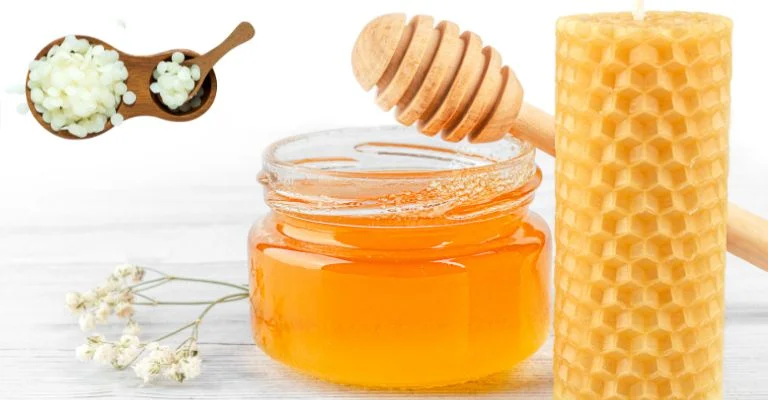The Importance of Beeswax: Understanding this Natural Wonder
Discover the excellent benefits and importance of beeswax – from its healing properties and nourishing effects to its numerous uses in beauty and home care products. Get the essential facts here!
In this blog post, we will explore the many benefits of beeswax and take a closer look at its properties and uses.
What is Beeswax?
Beeswax is a natural substance made by honeybees. It is a versatile and valuable material with a wide range of uses, including:
- Hive construction: Bees use beeswax to construct their hives, which provide a safe and protected environment for the queen and her brood. The honeycomb is made of beeswax and is used to store honey, pollen, and bee bread.
- Food and beverage industry: Beeswax is a food additive and processing aid. It is used as a thickener, emulsifier, and glazing agent in various foods and beverages, including candy, baked goods, and chewing gum.
- Cosmetics and personal care products: Beeswax is a typical ingredient in cosmetics and personal care products, such as lip balms, moisturizers, and soaps. It is known for its moisturizing and protective properties.
- Pharmaceutical industry: Beeswax is used in various pharmaceutical products, including ointments, suppositories, and capsules. It is also used to coat pills.
- Industrial applications: Beeswax is used in various industrial applications, such as candle making, furniture, and shoe polish. It is also used to make electrical components and musical instruments.
In addition to its practical uses, beeswax is important for its environmental benefits. Beeswax candles are a natural and sustainable option to petroleum-based candles. Beeswax is also biodegradable and non-toxic.
Beeswax is a valuable and versatile substance with a wide range of uses. It is important for the environment, the economy, and human health.
Importance of Beeswax
Here are some specific examples of the:
- Beeswax is essential for the survival of honeybees. Without beeswax, honeybees could not build their hives or store their food.
- Beeswax makes various sustainable and environmentally friendly products, such as beeswax candles and wraps.
- Beeswax is a natural and effective ingredient in cosmetics and personal care products.
- Beeswax is used to make various pharmaceutical products that help people with various medical conditions.
- Beeswax is used in various industrial applications, which helps support the economy.
Beeswax is an important substance with a wide range of uses for humans and the environment.

Uses of Beeswax
Beeswax is a versatile and valuable substance with a wide range of uses. It is a natural wax produced by honeybees, composed of a mixture of esters of fatty acids and long-chain alcohols. Beeswax has various unique properties, including waterproof, non-toxic, and biodegradable.
Most common uses of beeswax:
- Candle making: Beeswax is the most popular wax used for candle making. Beeswax candles have a clean, bright flame and a pleasant honey-like scent. They are also less likely to drip or smoke than other types of candles.
- Cosmetics: Beeswax is a common ingredient in cosmetics and personal care products, such as lip balm, moisturizer, soap, and shampoo. It is known for its moisturizing and protective properties.
- Food and beverage industry: Beeswax is a food additive and processing aid. It is used as a thickener, emulsifier, and glazing agent in various foods and beverages, such as candy, baked goods, and chewing gum.
- Pharmaceutical industry: Beeswax is used in various pharmaceutical products, such as ointments, suppositories, and capsules. It is also used to coat pills.
- Industrial applications: Beeswax is used in various industrial applications, such as furniture polish, shoe polish, and electrical components. It is also used to make musical instruments and crayons.
In addition to these common uses, beeswax can also be used for a variety of other purposes, such as:
- Waterproofing: Beeswax can waterproof fabrics, leather, and wood.
- Lubrication: Beeswax can be used to lubricate metal parts and wooden surfaces.
- Molding: Beeswax can be melted and molded into various shapes and objects.
- Firestarter: Beeswax is a flammable material that can be used to start fires.
- Pest control: Beeswax can control pests such as ants and termites.
Beeswax is a truly versatile and useful substance. It is a natural and sustainable resource with a wide range of applications in various industries.
The beeswax used for beauty products:
Beeswax is a popular ingredient in many beauty products due to its natural properties and benefits. Here are a few ways that beeswax is used in beauty products:
- Lip balm: It is a natural emulsifier and thickener, making it a perfect ingredient for lip balms. It helps to lock in moisture and protect the lips from environmental damage.
- Moisturizer: Beeswax is a natural humectant that helps retain moisture in the skin. It is often used as a base for lotions and creams to provide hydration and nourishment to the skin.
- Hair care: Beeswax is used in hair care products such as pomades and hair waxes to provide hold and control to hair. It helps to smooth and tame frizz and also helps to protect hair from environmental damage.
- Sunscreen: Beeswax has natural sunscreen properties, and it is used in some natural sunscreen products to provide protection from the sun’s harmful UV rays.
- Makeup: Beeswax is used in some natural makeup products as a binder to provide a smooth texture.
- Anti-aging: Beeswax is rich in Vitamin A, which is known to be beneficial for the skin. It can help to reduce fine lines and wrinkles and promote a youthful appearance.
They have several beneficial properties, making them a great ingredient in skin care products. It is a natural emollient that helps soften and moisturize the skin. It also has natural antibacterial properties, which can help to keep the skin clean and clear. Further, It is rich in Vitamin A, which is known to be beneficial for the skin.
Uses of Beeswax with Pros & Cons
| Uses of Beeswax | Pros | Cons |
|---|---|---|
| Lip Balm | Moisturizes and protects lips | Can be sticky or greasy |
| Moisturizer | Provides hydration and nourishment to the skin | Can be heavy for oily skin |
| Hair Care | Provides hold and control to hair | Can make hair feel greasy or heavy |
| Sunscreen | Provides natural sun protection | May not provide as much protection as chemical sunscreen |
| Makeup | Provides smooth texture | Can be heavy for oily skin |
| Anti-aging | Helps reduce fine lines and wrinkles | May not be effective for severe wrinkles |
NOTE: This table is a generalization, and the effectiveness of beeswax in these uses may depend on the product’s specific formulation.
How to use beeswax for skin?
Beeswax can be used for skin care in a variety of ways, such as:
- Make lip balm by mixing it with coconut oil and essential oils,
- creating a moisturizer by mixing it with coconut oil and shea butter,
- making a natural sunscreen by mixing it with coconut oil and zinc oxide,
- Making an anti-aging treatment by mixing it with coconut oil and essential oils.
- Creating an acne treatment by mixing it with tea tree oil and coconut oil.
- It’s necessary to do a patch examination before applying any new product to the skin.
Pros and Cons table of beeswax for skin
| Pros | Cons |
|---|---|
| Moisturizes and softens the skin | Can be heavy for oily skin |
| Has natural antibacterial properties | May cause breakouts in some people with sensitive skin |
| Rich in Vitamin A, beneficial for the skin | May clog pores if used in excess |
| Can be used as a natural sunscreen | |
| Can be used as an anti-aging treatment | |
| Can be used as a natural acne treatment |
Beeswax medicinal uses
It has been used in conventional medicine for centuries due to its medicinal properties. Here are a few examples of how beeswax is used medicinally:
- Wound healing: Beeswax has anti-inflammatory properties and is often used as a natural remedy for minor cuts, burns, and scrapes. It can help to soothe the skin and promote healing.
- Skin conditions: Beeswax has been used to treat various skin conditions, such as eczema and psoriasis. It helps to moisturize and protect the skin and has anti-inflammatory properties that can help to reduce redness and itching.
- Cold and flu: Beeswax has been used as a natural remedy for cold and flu symptoms. It can help to soothe sore throats and relieve coughs.
- Nasal congestion: Beeswax has been used as a natural remedy for nasal congestion. It can help to clear the nasal passages and relieve sinus pressure.
- Ear infections: Beeswax has been used as a natural remedy for ear infections. It can help to soothe pain and inflammation and may also help to clear up the infection.
- Pain relief: Beeswax has been used as a natural pain reliever. It is believed to have pain-relieving properties and can treat various conditions such as arthritis, sore muscles, and headaches.
Just to let you know, beeswax is not a substitute for medical treatment. It should always be used in intersection with a physician’s advice. It’s also essential to use high-quality, pure wax medicinally and ensure you’re not allergic to beeswax or its components.
Final Thoughts:
It is a natural wonder used for thousands of years in various applications. It is versatile and helpful, from candles and cosmetics to food and medicine. As we continue to learn more about its properties and benefits, it is clear that beeswax will continue to be an essential ingredient in many products for years.
Visit more about Hot tubs & Patio, and for more information about Beekeeping.
Common Queries: (Importance of Beeswax)
Q: How is beeswax produced? A: It is produced by honeybees. The wax is secreted by glands in the bees’ abdomen and is used to build the honeycomb in the hive.
Q: What are the properties of beeswax? A: Beeswax is highly pliable, a suitable sealant, and naturally antibacterial. It also has a low melting point, which makes it easy to work with.
Q: What are some common uses of beeswax? A: Some common use includes the production of candles, cosmetics, food, and medicine. It is also a coating for fruits and vegetables, a glaze for baked goods, and an ingredient in candy-making.
Q: Does beeswax have any medicinal properties? it is believed to have anti-inflammatory and pain-relieving properties and can treat various conditions such as wounds, burns, and skin irritation.
Q: Is beeswax safe for people with allergies or asthma? A: Yes, it is considered safe for people with allergies or asthma. It does not produce fumes or pollutants, making it a good choice for people with respiratory issues.










